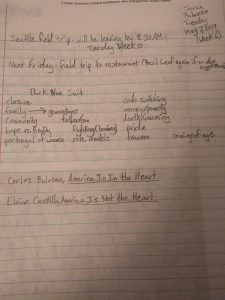
TagWeek 6
My first thought upon reading this article was “oh, neat! I didn’t know anything about any of these people”! This thought prompted me to think about why that might be, which made me examine the article more closely. There is only one woman listed in this article compared to 4 men, two of whom are of Japanese descent. I know that women tend to be excluded from politics even now, but I wonder how much of this article is because there weren’t a lot of influential women in politics and how much is a male bias showing.
I also noticed that the only two people on this list are who are still alive are the two Japanese men. Could they not find any more recent people who were more influential? The list doesn’t say anything about who brought the “most” change, so why didn’t they include anyone who did things more recently? Is it because there hasn’t been enough time for newer people to do something really notable, or because it hasn’t been long enough to see if their work actually changed anything? Or is the person who wrote the article biased and just chose people who were talked about the most? Since I’ve never heard of any of these people before, it’s difficult to say.
All that being said, I also noticed that all of their political accomplishments listed in this essay have to do with equality and fighting discrimination. I wonder if that’s because they’ve all faced discrimination in one way or another and all used that to inform their political views, or if it’s a coincidence, or even if the author specifically chose them because of this.
Dark Blue Suit
- “From places as different as San Francisco and Walla Walla they came to Seattle, just as they had for twenty or more earlier springs, laying down their dishrags and field knives – the tools of dead-end jobs – for a chance to go north and make Union scale.” (pg 4) What does making “Union scale” mean? Is that a slang term for money? It must be important if they were willing to come all the way from places like San Francisco to Seattle for it.
- “All Filipinos, all Communists, all part of the Union, or so the government said.” (pg 21) Why did the government equate Filipinos with Communism? Was there something going on with the Philippines at the time that would make them think that? Or was it just the government being racist and using any excuse to get rid of Unions and “foreigners”?
- “ “Government say they’re Communist. We get rid of ‘em, they get off our back.” … “They’re good men strong for the Union. Besides, who’s nex’ we do that? You? Me?” ” (pg 22) This is something that we’ve seen played out throughout the years, even currently. If the people in charge can get minorities to turn on each other, they’ll be easier to control because they won’t have support from each other to bolster their strength and numbers. It’s sad that this keeps happening.
© 2025 Sarah's A-POP Blog
Theme by Anders Norén — Up ↑